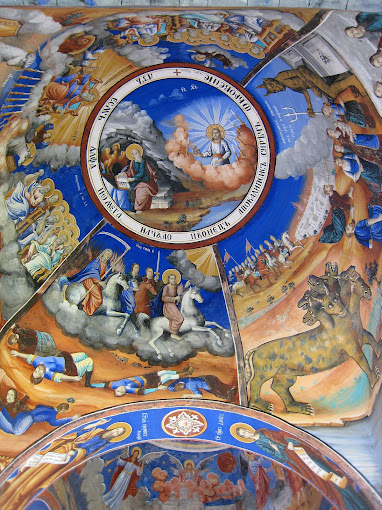He said in reply, “He who sows good seed is the Son of Man,
the field is the world, the good seed the children of the Kingdom.
The weeds are the children of the Evil One,
and the enemy who sows them is the Devil.
At a simple and superficial level this parable encourages endurance, assuring us that we will encounter opposition in the world. All the wheat trying to grow and bear fruit will have to deal with weeds. It is better to resolve oneself in advance to be patient. Attempts to create a world so controlled as to be free of trials always results in harming the innocent along with the guilty. This is not to say we don't try to leaven the dough of the world. It's message is rather about helping us come to terms with imperfection that is inevitable until the end of the age. We should not ignore the flaws of the world. But neither should we assume something is wrong when our attempts and efforts don't perfect the world. At such times we risk bringing force to bear in ways that are destructive, that ultimately do more harm than good.
At another level we can consider that our own hearts are merely a patch of soil. With care and diligence they can receive and nourish the good seed and bear fruit. Inattentiveness inevitability results in weeds. The good seed is small and the progress is often hidden from us. However, the evil seed makes itself obvious, and we can discover the warning signs in our own hearts before they can do permanent damage.
The weeds are the children of the Evil One,
and the enemy who sows them is the Devil.
The fundamental thing necessary for the good seed to grow is to receive and trust in the word of Jesus. It is a disposition where there is a fundamental concern for truth, even over appearances, even when it is an insult to our pride.
Why do you not understand what I say? It is because you cannot bear to hear my word. You are of your father the devil, and your will is to do your father's desires. He was a murderer from the beginning, and does not stand in the truth, because there is no truth in him. When he lies, he speaks out of his own character, for he is a liar and the father of lies. But because I tell the truth, you do not believe me (see John 8:43-45)
What is our relationship to the truth? Is it a matter of convenience for us, so that we acknowledge it when it helps us with our goals and when it helps us to grow in pride? Hopefully it is instead something which we seek after zealously, wholeheartedly, knowing that, however it feels at first, it is only the truth that can set us free (see John 8:32).
There is still plenty of time left for us, time to devolve further into weeds or time to be healed and transformed into healthy wheat, ready for the harvest. The fact that our destinies are not yet determined is cause for hope. He who sowed the good seed desires a harvest, not kindling. He will take care of the pruning necessary to ensure good fruit. None of us are yet where we want to be. But we are all further along than we used to be. Our growth, however hidden it may be, still gives us confidence. The seed is working within us and because of that we can await our blessed hope in peace, enduring the weeds for the sake of the eventual harvest.
Then the righteous will shine like the sun
in the Kingdom of their Father.
The Lord is more interested in mercy than condemnation. The weeds he allows, but the wheat he actively nourishes. If we have allowed ourselves to behave more like weeds than wheat, if we have been stiff-necked in the face of the mercy and grace of God, it is not too late. In what small way can we become a little less like weeds and a little more like wheat today?
This is indeed a stiff-necked people;
yet pardon our wickedness and sins,
and receive us as your own.

No comments:
Post a Comment